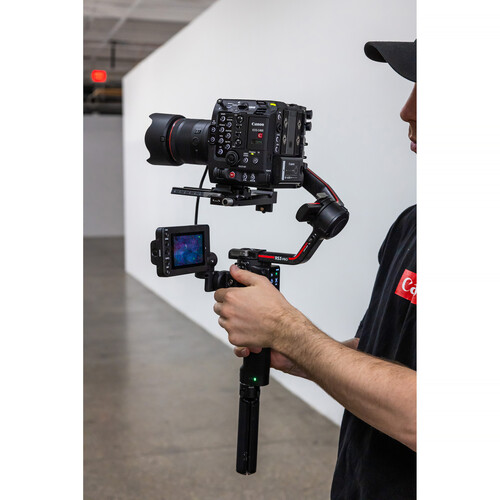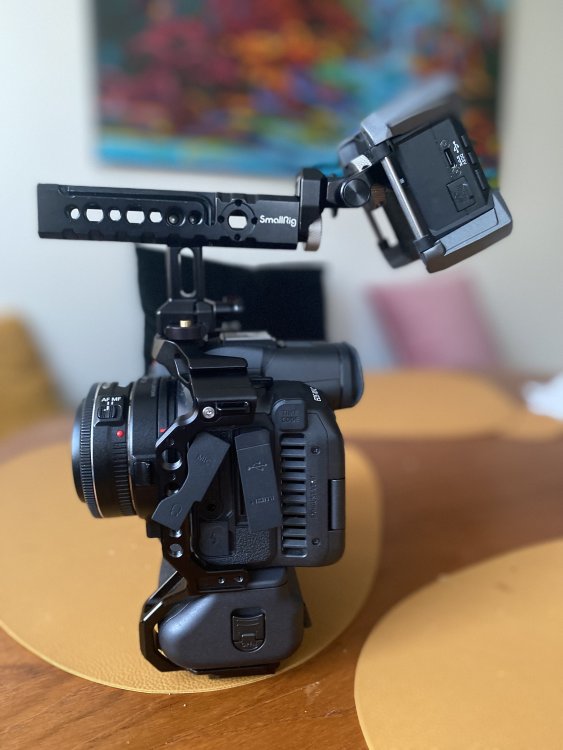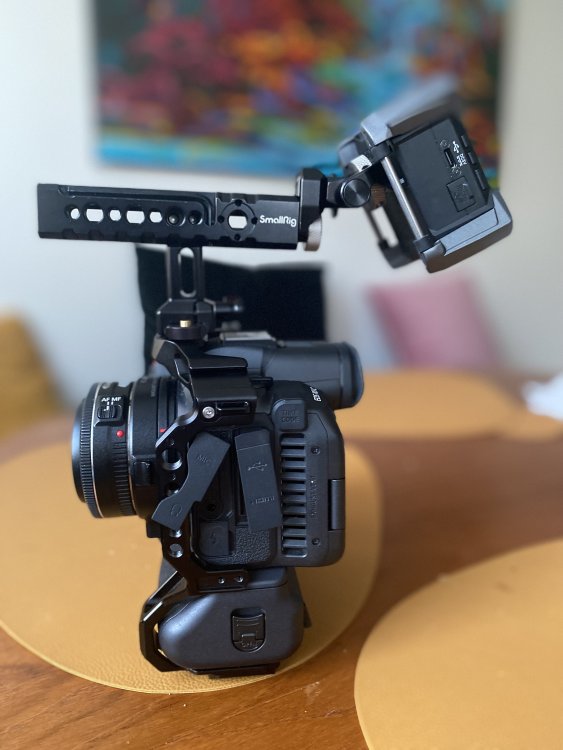-
Posts
494 -
Joined
-
Last visited
Content Type
Profiles
Forums
Articles
Everything posted by Ty Harper
-
El Zone is apparently included as well
-
Wow, so Matthew Allard over at Newsshooter is reporting that the Shinobi MKII will have a new FW update that allows it to do touch focus AF with the Canon R6 MKII (among other non-Canon cameras). The R5C is not on the list yet, but this all seems promising. Here's an excerpt from the original Atomos press release: "At IBC, Atomos (Hall 11, D25) announces major new functionality for Shinobi II, the amazingly successful Photo | Video Monitor. Users get a world’s first: on-monitor touch auto focus and focus subject tracking, in both photo and video camera modes, and it’s a free update for all existing users. The first camera models to be supported are from Sony (A7 MkIV), Canon (R6 Mark II), Panasonic (S5 II) and Fujifilm (GFX100 II). Nikon is also now supported for photo and video modes, with auto focus and focus subject tracking to follow in future updates." Sorry if this has already been posted but don't recall seeing it.
-
Wow, so Matthew Allard over at Newsshooter is reporting that the Shinobi MKII will have a new FW update that allows it to do touch focus AF with the Canon R6 MKII (among other non-Canon cameras). No other Canon cam is on the list yet, but this all seems promising. Here's an excerpt from the original Atomos press release: "At IBC, Atomos (Hall 11, D25) announces major new functionality for Shinobi II, the amazingly successful Photo | Video Monitor. Users get a world’s first: on-monitor touch auto focus and focus subject tracking, in both photo and video camera modes, and it’s a free update for all existing users. The first camera models to be supported are from Sony (A7 MkIV), Canon (R6 Mark II), Panasonic (S5 II) and Fujifilm (GFX100 II). Nikon is also now supported for photo and video modes, with auto focus and focus subject tracking to follow in future updates." Sorry if this has already been posted but don't recall seeing it.
-
Wow, so Matthew Allard over at Newsshooter is reporting that the Shinobi MKII will have a new FW update that allows it to do touch focus AF with the Canon R6 MKII (among other non-Canon cameras). No other Canon cam is on the list yet, but this all seems promising. Here's an excerpt from the original Atomos press release: "At IBC, Atomos (Hall 11, D25) announces major new functionality for Shinobi II, the amazingly successful Photo | Video Monitor. Users get a world’s first: on-monitor touch auto focus and focus subject tracking, in both photo and video camera modes, and it’s a free update for all existing users. The first camera models to be supported are from Sony (A7 MkIV), Canon (R6 Mark II), Panasonic (S5 II) and Fujifilm (GFX100 II). Nikon is also now supported for photo and video modes, with auto focus and focus subject tracking to follow in future updates." Sorry if this has already been posted but don't recall seeing it.
-
Film, vinyl, cassettes, etc - these formats were never gone. They just fell out of relevance with the 'mainstream' consumer and became 'niche'.
-
On a random reddit thread. Again totally a rumour, but it doesn't seem far fetched to think that Zoom would counter such a direct competitor to their F3 by either offering a FW update of some sort or an MKII. However, I'm not sure what FW update(s) they could offer that would make the F3 a more competitive option than the FR-AV2.
-
Zoom has been pretty good with the FW updates so fingers crossed all of this competition gets them to throw the OG Zoom F3 owners a bone or two.
-
There are also rumors of a Zoom F3 MKII on the way - so thinking I might also wait to see if that's true!
-
@IronFilmyou seen this?
-
Yeah, feels like the only thing left to know is maybe how good the pre-amps are?
-
Looks promising! https://tascam.com//us/product/fr-av2 https://www.bhphotovideo.com/c/product/1852610-REG/tascam_fr_av2_32_bit_float_recorder_timecode_generator.html
-
Maybe the Canon R7?
-
With Canon's new C400 shipping with a brand new detachable USB-C based monitor, I've been musing on whether it might be compatible with the R5C with a firmware update, similar to what Canon did to make the C200's LM-V1 monitor compatible with the C300 MKII. As far as the technical side goes, it seems like both the R5C and C400 have the exact same USB-C 3.2 Gen 1 port. Also, I did not know this but page 123 of the R5C's video manual seems to confirm that it can output a max 8K 30p resolution via its USB-C port. I also made a call to Canon USA tech support, and while the person could not confirm that the C400's monitor would be made compatible with the R5C, they did not outright deny that is was technically impossible. Now obviously I can't be sure the person I spoke to was a reliable source. I also think there might be a chance that while the R5C and the C400 have the same USB-C port, that the amount of power they can support might be different. All that said, it seems like there is a chance that at least technically speaking the C400's monitor (along with its coveted touch screen AF features) could be compatible with the R5C, which imo would be a fantastic addition to its feature set. Particularly for gimbal use. I've included a pic of the C400 with its monitor attached to an RS3 Pro to demonstrate what I'm getting at! Anyways, it would be great if the more tech savvy amongsr use could do their own digging to see if this is indeed true. But either way it probably wouldn't hurt to nudge Canon so at the very least they know there is demand for such a firmware update from R5C and maybe even C70 owners (altho I'm not sure if the C70 has the same USB-C port).
-
Yes the micro-hdmi port on the R5C is horrible. When I need to use a monitor I use either the Smallrig or Canon OEM port protector in tandem with the Smallrig's micro to full hdmi adapter. Aa far as pancake lens options, yes, the 24mm EF-S f2.8 would be your other option, or the 40mm pancake in tandem with Canon's 0.71x speedbooster which I use with the R5C in its s35 mode and is such a great piece of kit to have, and I imagine would be an even greater accessory for the C70 if you don't have it already.
-
-
Been working with or around full time camera ops in private and public broadcasting spaces here in Canada for over a decade at this point, and it's been Canon C300/100/300 MKIIs and now C300 MKIIIs/C70s/R5Cs. Mind you this is specifically in the arts and entertainment realms. For hard news stuff they prob go with Sony.
-
Yeah def gotta do what makes sense for your workflow. I get by np with this being the consistent core of my setups - so obviously very easy to swap batts out.
-
Yes basically the F3 is a different thing. I should have clarified that it only affects the line out. So if ur like me and use that to record into your cam them it is definitely a reason to not use V-mount batts. But again, rechargeable batts have been great for me! Also, here's a reddit discussing the line out/v-mount/hum issue:
-
Curious what you consider short battery life. I use the F3 almost exclusively now rigged to my R5C. I use Eneloop rechargeables and don't recall ever worrying about the batt life. One definite downside is if you power the F3 with a V-mount, you'll introduce some hum into your recording so avoid at all costs. Aside from that I love the Zoom F3!
-

AI = lower lens prices? Or complete collapse of lens market?
Ty Harper replied to Andrew - EOSHD's topic in Cameras
I highly doubt a beginner starting out in photography today is gna be JUST a photographer down the line. We are beyond that kind of career journey. Going with something like an R7 still allows you to use EF-L glass (which is getting cheaper by the day - and the real investment, obviously) while leaving you open to RF stuff in the future. -

AI = lower lens prices? Or complete collapse of lens market?
Ty Harper replied to Andrew - EOSHD's topic in Cameras
I would have to disagree there. In no scenario would it be prudent to invest in DSLRs. Not when a beginner can get an R7 for prices roughly $1K USD or even lower. Pickup a cheap adapter (or the 0.71x for another $300 used) and now they're pretty much set for the forseeable future. -

AI = lower lens prices? Or complete collapse of lens market?
Ty Harper replied to Andrew - EOSHD's topic in Cameras
I literally just made a post on an R5C Facebook group about the crazy drops in used EF-L prices - then I came over here and seen this post, lol. Haven't read Andrew's article yet but I will copy and paste what I posted in that group maybe 15 minutes ago: "Maaaan, in this month alone I saw EF 50mm f1.2Ls (in great condition) going for $500 USD (never thought I'd see the day!). Plus, I sold my EF 70-200mm f2.8L MKI a while back for $800 - and last week I bought the MKII version for the same price! Point is, it's only going to get better for anyone doubling down on used EF-L lenses - and that includes stuff like the Sigma 135mm f/1.8 ART." -
Pretty much! I made the mistake of buying a used R5, specifically for its IBIS, to pair with my R5C, and ended up regretting it bcuz the difference between IBIS and the R5C with internal DIS and/or IS lenses was not worth the advantages of getting acsecond R5C will never do that again. Luckily I was able to resell the R5 and get a second R5C for about the price as the used R5. Currently I use my R5Cs exclusively with EF lenses that have IS and have no complaints whatsoever (I use DIS now and then but very rarely). Basically, I know the cam's limitations and respect those limitations. For shots that require something beyond the stationary tripod-styled look I invested in an RS3 Pro (using it with IS stablized lens gives me the best results). For R5C users, the RS2/3/4 Pro are pretty much the best/only options - and many R5C users who tried to go for something more affordable ended up regretting it. So in 2024 it's still a horses/courses/practice-practice get to know your gear approach.
-

Firmware updates could become subscription model?
Ty Harper replied to Andrew - EOSHD's topic in Cameras
This strategy might've worked at the onset of the DSLR revolution when there was still a lot of room for cam improvement around essential features. But given where we're at with cam tech and needing for very little to tell a fantastic story - that is no longer the case. Right now, we actually seem to be arriving at a point where AI will disrupt our dependency - not just on using cameras to capture the world - but on the idea that we ALWAYS need cams/audio devices to tell visual/auditory stories that can 'authentically' capture our real world. That last part to me is one of the big things being blurred/contested. Either way, if you play it out, this particular type of subscription-based strategy will likely only work/make sense for large media companies, who for legal/tax reasons, do not buy gear from the used market. As someone who works for a large media corporation, what I am seeing/hearing first/second hand, is an increased interest in PTZ cams, along with AI apps that can cover multi-cam switching duties (a quick google search showed me one by CognitiveMill). In that case I can definitely see the subscription model working, bcuz PTZ's (from what I can tell) require no camera people per se - moreso tech support people who make sure these PTZ's are ready to go for any given multi-platform show, on any given day, and are on standby to troubleshoot any daily issues that come up. So in a case like that I definitely see the subscription model working - albeit at the expense of the loss/shrinking of jobs/shifts for camera people, etc. -

Firmware updates could become subscription model?
Ty Harper replied to Andrew - EOSHD's topic in Cameras
As a hobbyist whose day job intersects with the film world, I can say that there is no way I would ever buy into a subscription system - and I can say that because the two R5Cs with their current features are literally all I need for any and all present and future projects. I'll maybe get an R7/R6 MKII/R5 to fly on my RS3 Pro (bcuz the R5C cannot be used wirelessly with that gimbal) - and maaaybe a C70. But honestly I'm at the end of the road for camera purchases. But also I think the current cam selection is so amazing nowadays that a move to a subscription-based model will likely push even more people to the used market - and aside from storage media, every piece of gear (cam, lights, etc) I've ever bought in my hobbyist career (10+ years at this point) has been from the used market.






